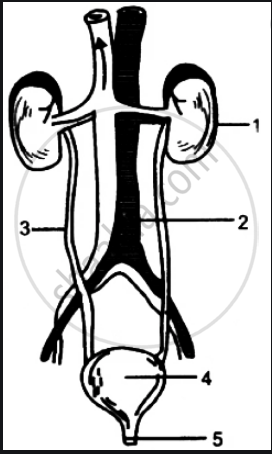Advertisements
Advertisements
प्रश्न
Arrange the excretory system in the correct sequence.
(Urinary bladder, Ureter, Kidney, Urethra).
Arrange in Correct sequence.
Urethra → Ureter → Urinary Bladder → Kidney
Arrange and rewrite the terms in the group in the correct order so as to be in a logical sequence beginning with the term that is underlined.
Urethra, Urinary bladder, Ureter, Kidney
उत्तर
Kidney, Ureter, Urinary bladder, Urethra.
APPEARS IN
संबंधित प्रश्न
Sketch and label 'structure of nephron'.
Fill in the blank.
.................. are a pair of reddish-brown, bean-shaped structures that lie on either side of the backbone.
Answer the following in short.
What are the main organs involved in the human excretory system?
Answer the following in short.
What is urethra?
Why is excretion necessary? Name the common excretory substance in our body.
Choose the correct answer:
Uric acid is excreted by _______________
Look at the figure given below. It is a section of human kidney as seen from the front.

Name the parts numbered 1-5.
Given below is the figure of certain organs and associated parts in the human body. Study the same and answer the question that follow:
Name the two main organic constituents of the fluid that flows down the part labeled '3'.

Write the functional activity of the following structure:
Ureter
Write the functional activity of the following structure: Urethra
Answer the following question.
Why are kidneys called 'retroperitoneal'?
Complete the diagram/chart with correct labels/ information. Write the conceptual details regarding it.

Identify the wrong match
Match the parts given in Column I with their physiological processes given in Column II.
| Column I | Column II | ||
| i. | Proximal convoluted tubule | a. | Formation of concentrated urine |
| ii. | Distal convoluted tubule | b. | Filtration of blood |
| iii. | Henle's loop | c. | Reabsorption of 70-80% of electrolytes |
| iv. | Vasa recta | d. | Ionic balance |
| v. | Malpighian body | e. | Counter mechanism |
The collective name given to a cup like structure containing a tuft of capillaries.
The Malpighian corpuscle lies in the______ of the kidney.
Analogy:
Neurons: Nervous system.
Nephrons: ______.
Which are the two main organic wastes present in urine?
In the process of urine formation, the maximum amount of water from the glomerular filtrate is reabsorbed in the ______.
Draw the human excretory system and label the parts.
Match Column I with Column II.
| Column I | Column II |
| A. PCT | (i) Concentrated urine formation |
| B. DCT | (ii) Filtration of blood |
| C. Loop of Henle | (iii) Reabsorption of 70-80% of the electrolyte |
| D. Counter current mechanism | (iv) Ionic balance |
| E. Renal corpuscle | (v) Maintenance of concentration gradient in medulla |
Select the correct option from the codes given below.
The maximum amount of electrolytes and water (70-80%) from the glomerular filtrate is reabsorbed in which part of the nephron.
The counter-current mechanism operates in nephron ______.
Which blood vessel has largest amount of urea?
Arrange and rewrite the terms in group in correct order to be in a logical sequence, beginning with the term that is underlined:
Loop of Henle, Distal convoluted tubule, Bowman's Capsule, Proximal convoluted tubule.
Give two examples of the following:
Accessory excretory organs
